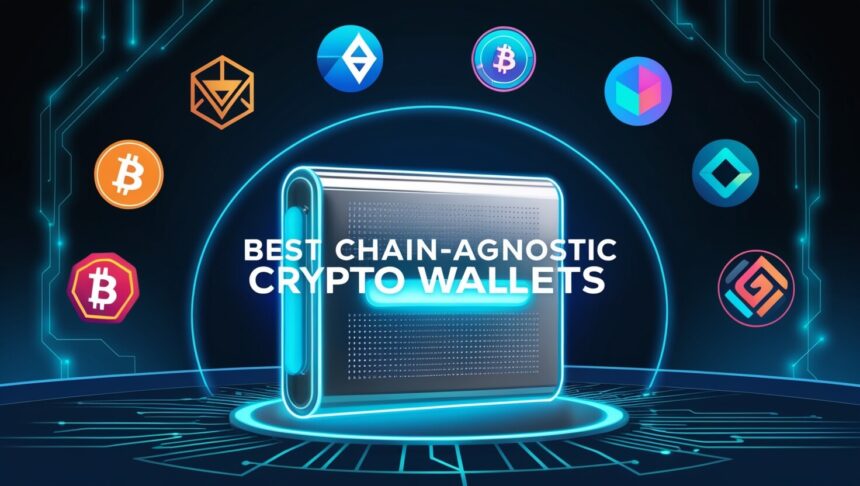This time I discuss the Best Chain-agnostic Crypto Wallets. These wallets offer a more versatile experience, allowing users to engage freely with DeFi, NFTs, and dApps regardless of a particular blockchain.
These wallets are user-friendly for novices and experts, ensuring a seamless experience throughout cryptocurrency activities.
Key Point & Best Chain-agnostic Crypto Wallets
| Wallet | Key Point |
|---|---|
| MetaMask | Popular for Ethereum and EVM chains, with broad dApp compatibility. |
| Trust Wallet | Supports 70+ blockchains and has a built-in DEX for swapping tokens. |
| Exodus | Offers a user-friendly desktop and mobile experience with multi-asset support. |
| Zengo | Uses keyless security (MPC tech) for easy and secure wallet access. |
| Best Wallet | Integrates Web3 dApps and NFT support in a sleek, multi-chain interface. |
| OKX Wallet | Built-in DeFi, NFT, and Web3 features with access to multiple blockchain apps. |
| Bitget Wallet | Formerly BitKeep; supports 90+ blockchains with a strong DeFi focus. |
| Guarda Wallet | Non-custodial wallet with desktop, mobile, and web versions for full control. |
| Coinomi | Long-standing wallet with broad asset support and integrated exchange features. |
1. MetaMask
MetaMask stands out for its effortless integration with Ethereum and other EVM compatible chains like Polygon, Arbitrum, and Binance Smart Chain as non custodial wallets. It acts as a gateway to DeFi and DApps while providing access to token swaps, NFT management, and customizable gas prices.
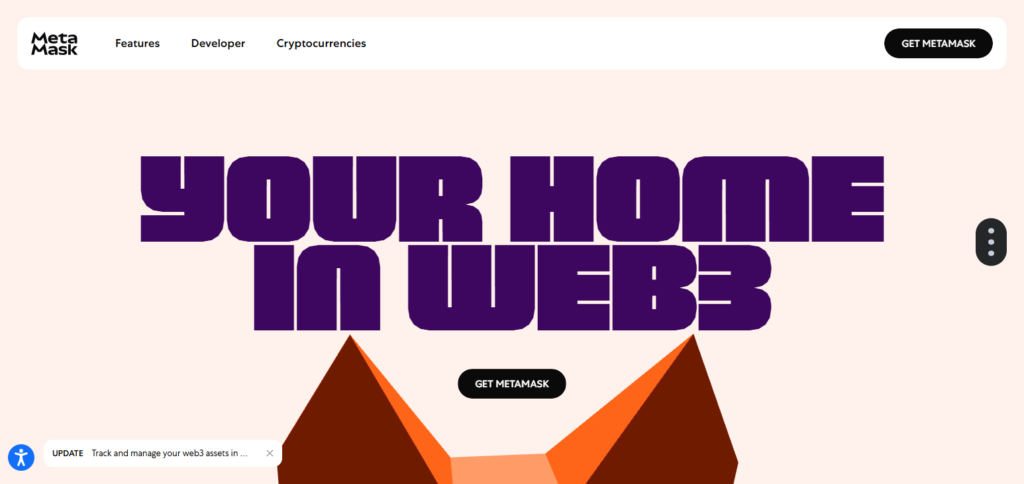
With privately stored keys and hardware wallet integration like ledger, security is also robust. MetaMask’s user interface is relatively simple which does cater to beginners but it comes at the cost of lacking native support for non EVM chains such as Solana.
Despite this, over 30 million users do regard MetaMask as infrastruction primary aimed at Ethereum users who wish to delve into decentralized ecosystems.
MetaMask Features
- Access via mobile app or browser extension.
- Supports Ethereum and its EVM-compatible chains (Polygon, Arbitrum, etc.).
- Built-in token swaps at competitive rates.
- Supports dApp integration with DeFi and Web3 platforms.
- NFT management along with display.
- Customizable gas fees for monetizable transaction control.
- Ledger and Trezor hardware wallets.
2. Trust Wallet
Trust Wallet provides mobile cryptocurrency users with comprehensive services, including a dApp browser, staking, and a built-in DEX. Through partnerships with Binance, the Wallet has expanded the number of blockchains it supports to over 100, including Bitcoin, Ethereum, Solana, and Cosmos, while managing millions of NFTs and tokens.
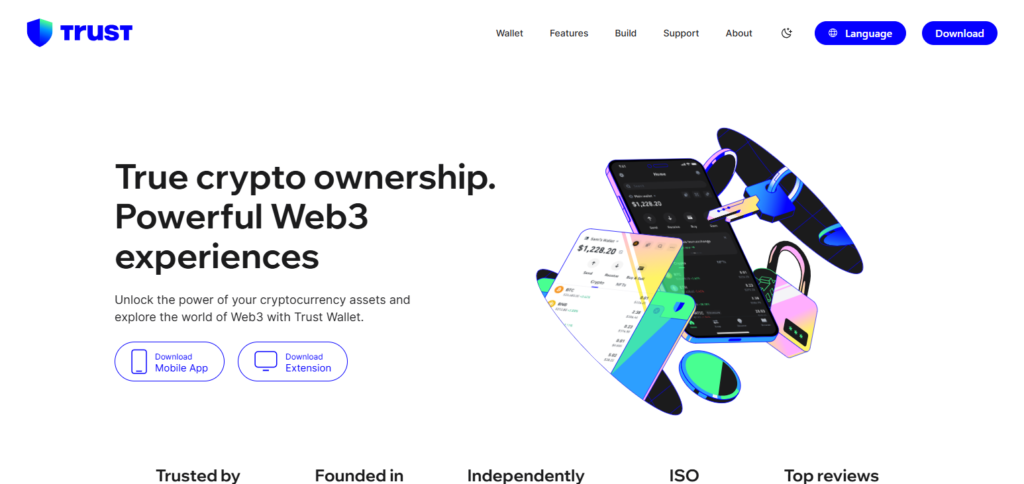
Safety is enhanced through the optional use of two-factor authentication, non-custodial key storage, audits by Kudelski Security, and intel on potential scams. However, some of the Wallet’s security perks do come at the cost of convenience.
Accessing Trust Wallet’s extension on desktop can feel unwieldy. Ultimately, the Wallet’s sleek mobile interface devoid of KYC barriers makes it appealing for users with diversified portfolios seeking easy access to new chains.
Trust Wallet Features
- Over a hundred blockchain platforms are supported (Bitcoin, Ethereum, Solana, etc).
- DEX for exchanging tokens between different blockchains directly from the wallet.
- Web3 built-in dApp browser enables easy interface with decentralized applications.
- Staking available for BNB, ATOM, and other assets.
- Asset management includes storing and managing NFTs.
- Alerts for suspicious transactions that may indicate scams.
3. Exodus
Providing convenience for both mobile and desktop users, Exodus is an all-in-one wallet supporting over 50 blockchains, including Bitcoin, Ethereum, Solana and Cardano. The wallet promotes an intuitive user experience with built-in staking, token exchange, and NFT galas.
Advanced security measures like integrating Trezor cold storage bolster user privacy, although some might find the wallet’s closed-source code alarming. Non-custodial key management guarantees users full control over their assets.
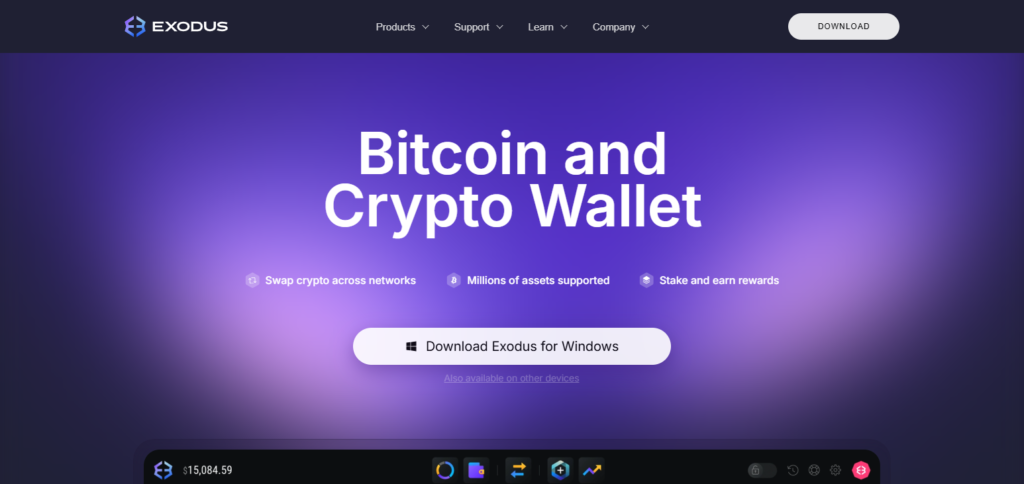
Combine this lack of two-factor authentication with flexible fiat gateways through MoonPay and the wallet becomes ever more alluring for those new to crypto.
The sleek design and streamlined user interface tailored for casual users does come with the price of advanced DeFi traders finding the lack of intricate features underwhelming.
Exodus Features
- Access through various devices—desktop, mobile, and browser.
- Over fifty blockchain platforms supported (Bitcoin, Solana, Cardano).
- Token exchanging through DEX integrated within the wallet.
- Staking available for ADA, SOL, and other assets.
- NFT gallery available for collectibles.
- MoonPay and Ramp allow ramping up fiat currencies.
4. Zengo
Zengo eliminates seed phrase exploits by keyless multi-party computation (MPC) wallet security, a first in the world. It also secures Ethereum, Bitcoin, Polygon, and others with staking, in-wallet swaps, and a Web3 dApp firewall protecting against malicious applications.
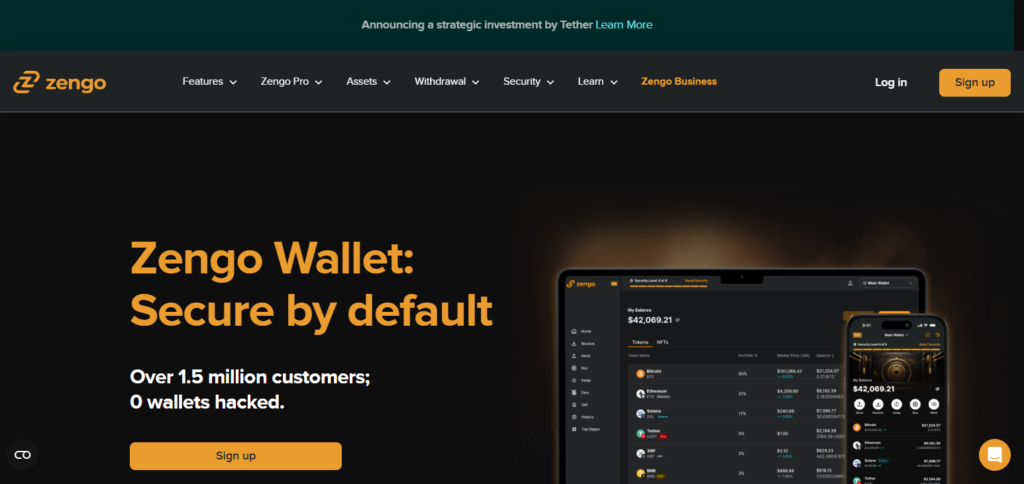
Security includes no reported hacks, 3D FaceLock, and cloud backups with top-tier redundancy. Limited premium features in Zengo Pro and chains like XRP not supported may be drawbacks for some.
Its mobile app is user-friendly for novices anxious about traditional key management. Zengo is ideal for users looking for an effortless experience without compromising security features, although users needing a wide range of blockchains will not have the compatibility they need.
Zengo Features
- Wallet without private keys secured by the company’s joint MPC technology.
- Supports major cryptocurrencies including Ethereum, Bitcoin, Polygon, etc.
- Face biometrics recognition tools for authentication.
- Web3 firewall prevents threats of other malicious dApps.
- Tokens exchanged and staked directly in the wallet.
- Recovery through cloud storage system.
5. Best Wallet
Best Wallet outshines competitors with access to presale tokens and cross-chain swaps. With over 60 supported blockchains including Bitcoin, Ethereum, and Solana, its mobile app also comes with a DEX, portfolio tracker, and airdrop rewards associated with the $BEST token.
Standards of Best Wallet include biometric authentication, custodial-free storage, and military-grade encryption, though its unestablished status does leave it open to less community scrutiny.
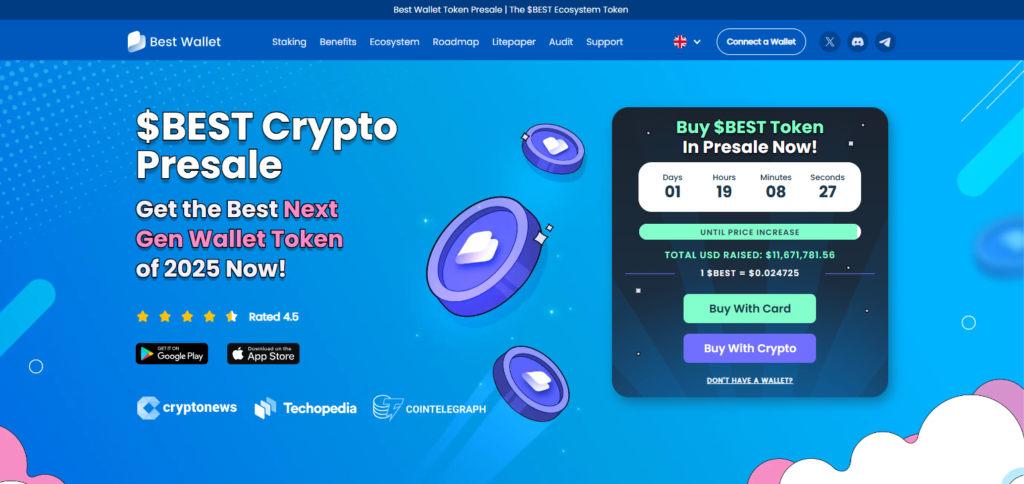
The interface lacks advanced market insight tools, but their absence may still be balanced by ample casual user crowding in. Best Wallet is perfect for aggressive investors eager to find new projects to pour into, especially if they are comfortable using newer platforms.
It shifts away from a conservative approach for those seeking reliable ecosystems due to its presale-centric stance.
Best Wallet Features
- Supports 60+ blockchains (Bitcoin, Ethereum, Solana).
- Built-in DEX for cross-chain swaps.
- Portfolio manager with market analytics.
- Airdrop rewards through the $BEST token.
- NFT trading and management.
- Biometric security for authentication.
6. OKX Wallet
Supporting over 70 blockchains and Ethereum, Solana, and Aptos, OKX Wallet caters to DeFi users with cross-chain trading, NFT marketplaces, and staking. Users maintain control of their assets thanks to a non-custodial structure which utilizes multi-signature support along with two-factor authentication.

Peer-to-peer market and dApp functionalities add sophistication, while selectively tailor features towards advanced users. Audits done on wallets guarantee their reliability; however, features like basic language support tend to be neglected at times.
OKX Wallet offers powerful features that make it a favorite among Web3 users, especially those looking for diversified access to multiple trading chains. With OKX, DeFi users are offered unmatched functionality regardless of complexity posed by features. Casual users may find other tools suitable.
Okx Wallet Features
- 70+ blockchains supported (Ethereum, Aptos, Solana).
- Low-fare cross-chain trading.
- NFT marketplace for selling and buying.
- Inbuilt dApp browser for DeFi.
- Stake various assets.
- P2P place for direct asset trades.
7. Bitget Wallet
Blending trading tools with Web3 access, Bitget Wallet supports more than a hundred blockchains alongside 500,000 available tokens. Active traders are supported through functionalities like GetGas for effortless gas fee unification, Smart Money Alerts, and a Launchpad aimed at listing newer projects.
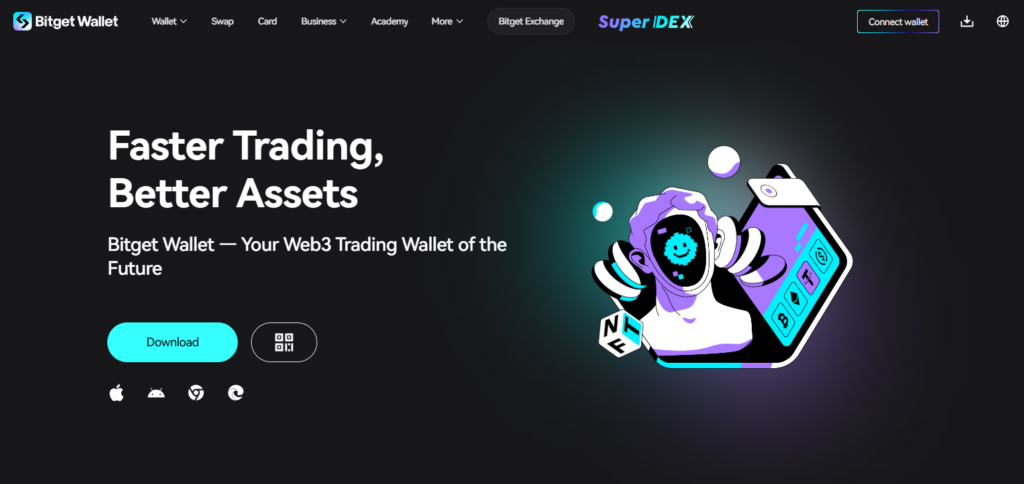
Protection standards are rigorous with the absence of a centralized key and multi-layer encryption raising security levels alongside a $300 million protection fund. The non-custodial nature of the wallet allows users to maintain full control, although novice traders might be puzzled by the feature-dense design.
The strength offered by Bitget excel makes it appealing for those actively participating in – offer real-time DeFi, NFT market insights. Lacking complexity, seasoned crypto enthusiasts find value in Bitget making the wallet one of the top contenders for users.
Bitget Wallet Features
- 100+ blockchains and 500000+ tokens supported.
- Unified gas fee payments GetGas.
- Golden rule for effortless Smart Money Alerts.
- Launchpad for fresh token projects.
- DEX for swaps inside wallet.
- Store and trade NFTs.
- Passive income through staking.
8. Guarda Wallet
Guarda Wallet has wallet functionality for both mobile and desktops with web access and supports Ethereum, Bitcoin, as well as Cardano. Further, it has web support for over 50 blockchains.
The wallet is non custodial, hence the users have control with Ledger security integrations for enhanced security. It also allows stake holding, in wallet swapping, and has no KYC requirements, thus appealing to privacy permanent features.
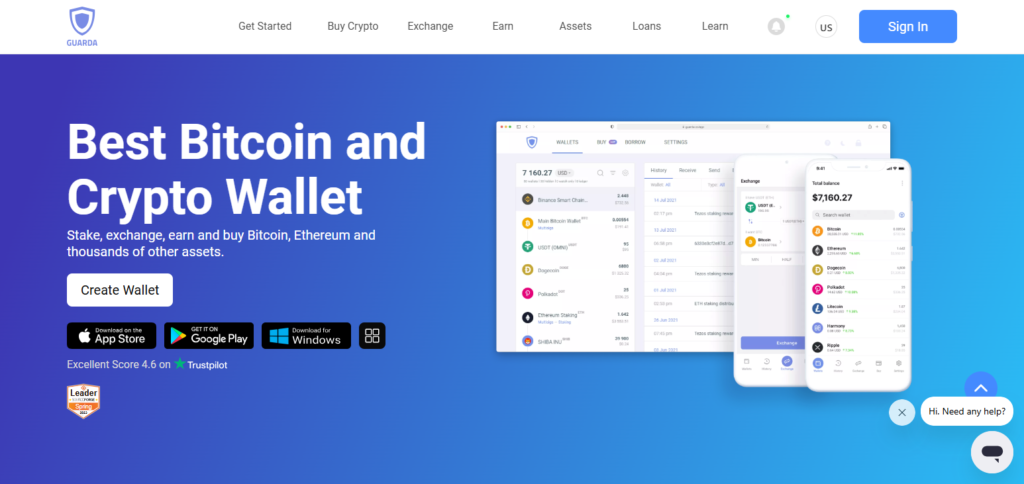
On the downside, the wallet fails with dApp interoperability in comparison to MetaMask which makes Guarda’s high in-app exchange fees of 3.5 % counterproductive.
Also, the design is not appealing for dealing with DeFi tasks thus while it is helpful for handling many assets through different platforms, those looking for advanced decentralized applications functionalities will struggle. The wallet is perfect for users who prioritize anonymity and seamless chain interactivity.
Guarda Wallet Features
- Over 50 blockchains and 400,000+ assets are supported.
- Ways to swap tokens within the wallet through Changelly.
- Assets such as XTZ and ADA can be staked.
- Integrated with Ledger hardware wallets.
- No KYC when creating the wallet.
9. Coinomi
Veteran Coinomi wallet addresses the complaints from its userbase by allowing blockchain interactivity with Binance Smart Chain and over 1,770 assets, Ethereum, and Bitcoin. Unfortunately, the lack of open source code nullifies custodial and privacy design promises due to enforced powerful encryption.
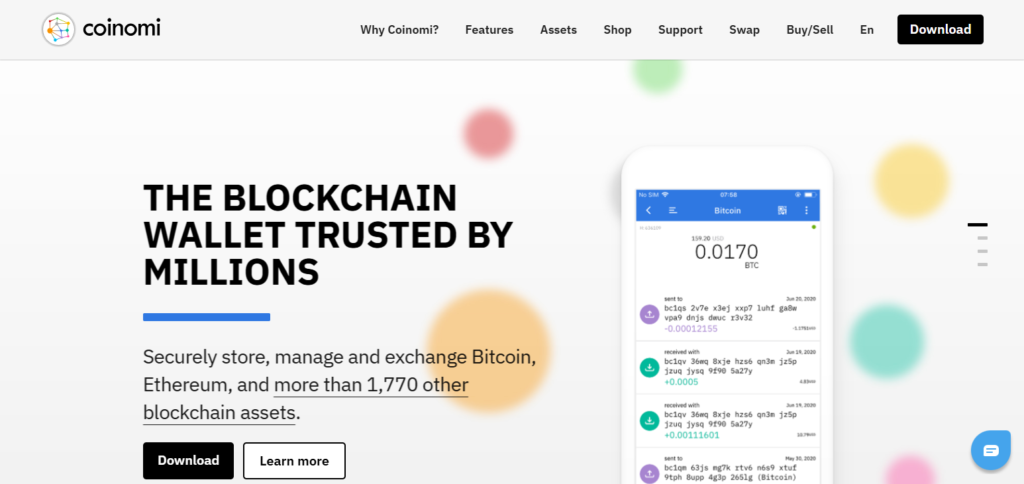
Further restrictions include support for other languages, as well as in wallet swapping without the requirement of creating an account. Even if functional, the windows based system is out of touch with contemporary looks, also omitting the DeFi dApp.
Additional support for niche tokens while keeping anonymity intact makes Coinomi useful. Both seasoned and new crypto investors looking for a reliable privacy centered wallet thrive, even if newer web 3 tools offer better interfacing.
Coinomi Features
- Over 1770 assets based on different blockchains are supported.
- Tokens can be swapped through the in-wallet features of ShapeShift and Changelly.
- No account or KYC is needed.
- Support for over 20 languages.
- Users can be flexible in setting transaction fees.
- An HD wallet is made available.
Conclusion
Selecting a chain agnostic cryptocurrency wallet guarantees a wallet that is more flexible, supports a broader range of assets, and interacts seamlessly with different blockchains. MetaMask Wallet, Trust Wallet, and OXK Wallet are examples of wallets that serve both advanced and novice users with their tailored offerings.
The listed wallets enable the user to securely access and manage a multitude of crypto assets across various blockchains, regardless of whether their main focus is security, user experience, or even decentralized finance (DeFi).


